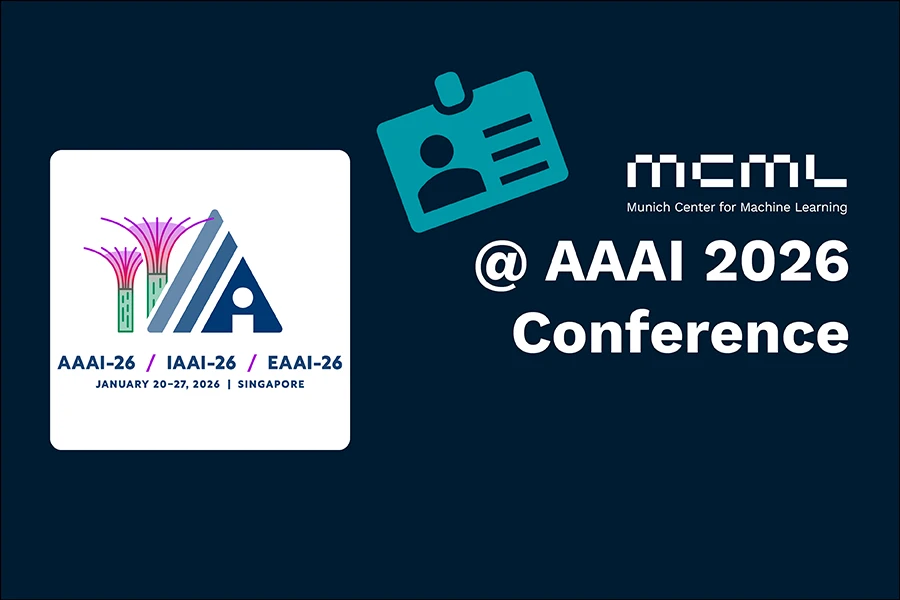Research Group Frauke Kreuter
Frauke Kreuter
holds the Chair of Statistics and Data Science at LMU Munich.
Her reserach is interested in all matters of social data science, ranging from fairness in automated decision-making to the use of new data sources in the social sciences, multiple imputation methods, survey methodology, social NLP, and statistical training.
Team members @MCML
PostDocs
PhD Students
Recent News @MCML
Publications @MCML
2026
[78]

B. Ma • Y. Cao • I. Sen • A.-C. Haensch • F. Kreuter • B. Plank • D. Hershcovich
Too Open for Opinion? Embracing Open-Endedness in Large Language Models for Social Simulation.
EACL 2026 - 19th Conference of the European Chapter of the Association for Computational Linguistics. Rabat, Morocco, Apr 24-29, 2026. arXiv
Too Open for Opinion? Embracing Open-Endedness in Large Language Models for Social Simulation.
EACL 2026 - 19th Conference of the European Chapter of the Association for Computational Linguistics. Rabat, Morocco, Apr 24-29, 2026. arXiv
[77]

S. Ball • G. Gluch • S. Goldwasser • F. Kreuter • O. Reingold • G. N. Rothblum
On the Impossibility of Separating Intelligence from Judgment: The Computational Intractability of Filtering for AI Alignment.
ICLR 2026 - 14th International Conference on Learning Representations. Rio de Janeiro, Brazil, Apr 23-27, 2026. To be published. Preprint available. arXiv
On the Impossibility of Separating Intelligence from Judgment: The Computational Intractability of Filtering for AI Alignment.
ICLR 2026 - 14th International Conference on Learning Representations. Rio de Janeiro, Brazil, Apr 23-27, 2026. To be published. Preprint available. arXiv
[76]

A. Liu • Y. Karoui • F. Draxler • F. Kreuter • F. Chiossi
Sensing What Surveys Miss: Understanding and Personalizing Proactive LLM Support by User Modeling.
CHI 2026 - ACM CHI Conference on Human Factors in Computing Systems. Barcelona, Spain, Apr 13-17, 2026. To be published. Preprint available. arXiv
Sensing What Surveys Miss: Understanding and Personalizing Proactive LLM Support by User Modeling.
CHI 2026 - ACM CHI Conference on Human Factors in Computing Systems. Barcelona, Spain, Apr 13-17, 2026. To be published. Preprint available. arXiv
[75]
S. Ball • S. Allmendinger • N. Kühl • F. Kreuter
Reading Between the Tokens: Improving Preference Predictions through Mechanistic Forecasting.
Preprint (Feb. 2026). arXiv
Reading Between the Tokens: Improving Preference Predictions through Mechanistic Forecasting.
Preprint (Feb. 2026). arXiv
[74]

Y. Lei • X. Ge • Y. Zhang • Y. Yang • B. Ma
Do Large Language Models Think Like the Brain? Sentence-Level Evidence from fMRI and Hierarchical Embeddings.
AAAI 2026 - 40th Conference on Artificial Intelligence. Singapore, Jan 20-27, 2026. To be published. Preprint available. arXiv
Do Large Language Models Think Like the Brain? Sentence-Level Evidence from fMRI and Hierarchical Embeddings.
AAAI 2026 - 40th Conference on Artificial Intelligence. Singapore, Jan 20-27, 2026. To be published. Preprint available. arXiv
[73]
L. Bondo Andersen • T. Wistuba • F. Henninger • A. Liu • S. Greven • F. Kreuter
Clustering Mouse Movement Behavior in Surveys Using ResNet Embeddings.
NLDL 2026 - Northern Lights Deep Learning Conference. Tromsø, Norway, Jan 06-08, 2026. To be published. Preprint available. URL
Clustering Mouse Movement Behavior in Surveys Using ResNet Embeddings.
NLDL 2026 - Northern Lights Deep Learning Conference. Tromsø, Norway, Jan 06-08, 2026. To be published. Preprint available. URL
[72]
T. Wistuba • L. Bondo Andersen • A. Liu • F. Henninger • F. Kreuter • S. Greven
Comparison of Neural Networks and Gradient Boosting Models on Ordinal Age Class Prediction using Mouse Trajectories.
NLDL 2026 - Northern Lights Deep Learning Conference. Tromsø, Norway, Jan 06-08, 2026. To be published. Preprint available. URL
Comparison of Neural Networks and Gradient Boosting Models on Ordinal Age Class Prediction using Mouse Trajectories.
NLDL 2026 - Northern Lights Deep Learning Conference. Tromsø, Norway, Jan 06-08, 2026. To be published. Preprint available. URL
[71]
Z. Gong • C. Dai • B. Ma • M. Ma • M. Sharma • T. Q. On • M. Morparia • B. Enos • Y. Yu • P. Resnik • S. Levitan • J. Hirschberg
A Survey on Mental Health Datasets and Resources.
Preprint (Jan. 2026). DOI
A Survey on Mental Health Datasets and Resources.
Preprint (Jan. 2026). DOI
[70]
[69]
C. Yuan • B. Ma • Z. Zhang • B. Prenkaj • F. Kreuter • G. Kasneci
Moral Lenses, Political Coordinates: Towards Ideological Positioning of Morally Conditioned LLMs.
Preprint (Jan. 2026). arXiv
Moral Lenses, Political Coordinates: Towards Ideological Positioning of Morally Conditioned LLMs.
Preprint (Jan. 2026). arXiv
2025
[68]
E. Nie • S. Yuan • B. Ma • H. Schmid • M. Färber • F. Kreuter • H. Schütze
Decomposed Prompting: Probing Multilingual Linguistic Structure Knowledge in Large Language Models.
Findings @IJCNLP 2025 - Findings of the 14th International Joint Conference on Natural Language Processing. Mumbai, India, Dec 20-24, 2025. URL
Decomposed Prompting: Probing Multilingual Linguistic Structure Knowledge in Large Language Models.
Findings @IJCNLP 2025 - Findings of the 14th International Joint Conference on Natural Language Processing. Mumbai, India, Dec 20-24, 2025. URL
[67]
I. Ziegler • B. Ma • B. Bischl • B. Schubert • E. Dorigatti
Enhancing Multi-Epitope Vaccine Effectiveness Through State-of-the-Art Proteasomal Cleavage Prediction With Deep Learning.
BIPM 2025 - IEEE International Conference on Bioinformatics and Biomedicine. Wuhan, China, Dec 15-18, 2025. DOI GitHub
Enhancing Multi-Epitope Vaccine Effectiveness Through State-of-the-Art Proteasomal Cleavage Prediction With Deep Learning.
BIPM 2025 - IEEE International Conference on Bioinformatics and Biomedicine. Wuhan, China, Dec 15-18, 2025. DOI GitHub
[66]
P. O. Schenk • C. Kern • F. Kreuter
Fairness in Machine Learning for National Statistical Organizations.
Foundations and Advances of Machine Learning in Official Statistics. Dec. 2025. DOI
Fairness in Machine Learning for National Statistical Organizations.
Foundations and Advances of Machine Learning in Official Statistics. Dec. 2025. DOI
[65]
A. Fuchs • E. Noltenius • C. Weinzierl • B. Ma • A.-C. Haensch
Measuring Sexism in US Elections: A Comparative Analysis of X Discourse from 2020 to 2024.
CODI @EMNLP 2025 - 6th Workshop on Computational Approaches to Discourse, Context and Document-Level Inferences at the Conference on Empirical Methods in Natural Language Processing. Suzhou, China, Nov 04-09, 2025. DOI
Measuring Sexism in US Elections: A Comparative Analysis of X Discourse from 2020 to 2024.
CODI @EMNLP 2025 - 6th Workshop on Computational Approaches to Discourse, Context and Document-Level Inferences at the Conference on Empirical Methods in Natural Language Processing. Suzhou, China, Nov 04-09, 2025. DOI
[64]

C. Wu • B. Ma • Y. Liu • Z. Zhang • N. Deng • Y. Li • B. Chen • Y. Zhang • Y. Xue • B. Plank
M-ABSA: A Multilingual Dataset for Aspect-Based Sentiment Analysis.
EMNLP 2025 - Conference on Empirical Methods in Natural Language Processing. Suzhou, China, Nov 04-09, 2025. DOI
M-ABSA: A Multilingual Dataset for Aspect-Based Sentiment Analysis.
EMNLP 2025 - Conference on Empirical Methods in Natural Language Processing. Suzhou, China, Nov 04-09, 2025. DOI
[63]
C. Wu • Y. Cai • Y. Liu • P. Zhu • Y. Xue • Z. Gong • J. Hirschberg • B. Ma
Multimodal Emotion Recognition in Conversations: A Survey of Methods, Trends, Challenges and Prospects.
Findings @EMNLP 2025 - Findings of the Conference on Empirical Methods in Natural Language Processing. Suzhou, China, Nov 04-09, 2025. DOI
Multimodal Emotion Recognition in Conversations: A Survey of Methods, Trends, Challenges and Prospects.
Findings @EMNLP 2025 - Findings of the Conference on Empirical Methods in Natural Language Processing. Suzhou, China, Nov 04-09, 2025. DOI
[62]
S. Eckman • B. Ma • C. Kern • R. Chew • B. Plank • F. Kreuter
Aligning NLP Models with Target Population Perspectives using PAIR: Population-Aligned Instance Replication.
NLPerspectives @EMNLP 2025 - 4th Workshop on Perspectivist Approaches to NLP at the Conference on Empirical Methods in Natural Language Processing. Suzhou, China, Nov 04-09, 2025. DOI
Aligning NLP Models with Target Population Perspectives using PAIR: Population-Aligned Instance Replication.
NLPerspectives @EMNLP 2025 - 4th Workshop on Perspectivist Approaches to NLP at the Conference on Empirical Methods in Natural Language Processing. Suzhou, China, Nov 04-09, 2025. DOI
[61]

F. Kreuter
AAPOR Presidential Address 'That Ain’t the Way I Heard It!' On the Role of Surveys in Shaping (and Being Shaped by) Generative AI.
Public Opinion Quarterly 89.3. Nov. 2025. DOI
AAPOR Presidential Address 'That Ain’t the Way I Heard It!' On the Role of Surveys in Shaping (and Being Shaped by) Generative AI.
Public Opinion Quarterly 89.3. Nov. 2025. DOI
[60]
J. Kappenberger • C. Strasser Ceballos • F. Gerdon • D. Szafran • F. Rupp • K. Eckert • H. Stuckenschmidt • R. Bach • F. Kreuter • C. Kern
Unintended Impacts of Automation for Integration? Simulating Integration Outcomes of Algorithm-Based Refugee Allocation in Germany.
AIES 2025 - AAAI/ACM Conference on AI, Ethics, and Society. Madrid, Spain, Oct 20-25, 2025. DOI
Unintended Impacts of Automation for Integration? Simulating Integration Outcomes of Algorithm-Based Refugee Allocation in Germany.
AIES 2025 - AAAI/ACM Conference on AI, Ethics, and Society. Madrid, Spain, Oct 20-25, 2025. DOI
[59]
L. von der Heyde
Who Counts? The Potentials and Pitfalls of Using LLMs in Survey Research.
NLPOR @COLM 2025 - 1st Workshop on Bridging NLP and Public Opinion Research at the Conference on Language Modeling. Montreal, Canada, Oct 07-09, 2025. URL
Who Counts? The Potentials and Pitfalls of Using LLMs in Survey Research.
NLPOR @COLM 2025 - 1st Workshop on Bridging NLP and Public Opinion Research at the Conference on Language Modeling. Montreal, Canada, Oct 07-09, 2025. URL
[58]
L. von der Heyde • A.-C. Haensch • B. Weiß • J. Daikeler
AIn't Nothing But a Survey? Using Large Language Models for Coding German Open-Ended Survey Responses on Survey Motivation.
NLPOR @COLM 2025 - 1st Workshop on Bridging NLP and Public Opinion Research at the Conference on Language Modeling. Montreal, Canada, Oct 07-09, 2025. URL
AIn't Nothing But a Survey? Using Large Language Models for Coding German Open-Ended Survey Responses on Survey Motivation.
NLPOR @COLM 2025 - 1st Workshop on Bridging NLP and Public Opinion Research at the Conference on Language Modeling. Montreal, Canada, Oct 07-09, 2025. URL
[57]
J. Beck
Improving annotation quality: empirical insights into bias, human-AI collaboration, and workflow design.
Dissertation LMU München. Oct. 2025. DOI
Improving annotation quality: empirical insights into bias, human-AI collaboration, and workflow design.
Dissertation LMU München. Oct. 2025. DOI
[56]
S. Ball • N. Hasrati • A. Robey • A. Schwarzschild • F. Kreuter • Z. Kolter • A. Risteski
Toward Understanding the Transferability of Adversarial Suffixes in Large Language Models.
Preprint (Oct. 2025). arXiv
Toward Understanding the Transferability of Adversarial Suffixes in Large Language Models.
Preprint (Oct. 2025). arXiv
[55]
S. Ball • A. Haupt
Don't Walk the Line: Boundary Guidance for Filtered Generation.
Preprint (Oct. 2025). arXiv
Don't Walk the Line: Boundary Guidance for Filtered Generation.
Preprint (Oct. 2025). arXiv
[54]
C. Hobelsberger • T. Winner • A. Nawroth • O. Mitevski • A.-C. Haensch
Systematic Evaluation of Uncertainty Estimation Methods in Large Language Models.
Preprint (Oct. 2025). arXiv
Systematic Evaluation of Uncertainty Estimation Methods in Large Language Models.
Preprint (Oct. 2025). arXiv
[53]
B. Ma • Y. Yao • A.-C. Haensch
Capabilities and Evaluation Biases of Large Language Models in Classical Chinese Poetry Generation: A Case Study on Tang Poetry.
Preprint (Oct. 2025). arXiv
Capabilities and Evaluation Biases of Large Language Models in Classical Chinese Poetry Generation: A Case Study on Tang Poetry.
Preprint (Oct. 2025). arXiv
[52]
J. Simson • A. Fabris • C. Fröhner • F. Kreuter • C. Kern
Bias Begins with Data: The FairGround Corpus for Robust and Reproducible Research on Algorithmic Fairness.
Preprint (Oct. 2025). arXiv
Bias Begins with Data: The FairGround Corpus for Robust and Reproducible Research on Algorithmic Fairness.
Preprint (Oct. 2025). arXiv
[51]
W. Zhou • B. Ma • A. Friedrich • M. Mesgar
Table Question Answering in the Era of Large Language Models: A Comprehensive Survey of Tasks, Methods, and Evaluation.
Preprint (Oct. 2025). arXiv
Table Question Answering in the Era of Large Language Models: A Comprehensive Survey of Tasks, Methods, and Evaluation.
Preprint (Oct. 2025). arXiv
[50]

S. Dutta • T. Kaufmann • G. Glavaš • I. Habernal • K. Kersting • F. Kreuter • M. Mezini • I. Gurevych • E. Hüllermeier • H. Schütze
Problem Solving Through Human-AI Preference-Based Cooperation.
Computational Linguistics 51.4. Sep. 2025. DOI
Problem Solving Through Human-AI Preference-Based Cooperation.
Computational Linguistics 51.4. Sep. 2025. DOI
[49]
[48]
J. Beck • S. Eckman • C. Kern • F. Kreuter
Bias in the Loop: How Humans Evaluate AI-Generated Suggestions.
Preprint (Sep. 2025). arXiv
Bias in the Loop: How Humans Evaluate AI-Generated Suggestions.
Preprint (Sep. 2025). arXiv
[47]
L. von der Heyde • A.-C. Haensch • B. Weiß • J. Daikeler
AIn't Nothing But a Survey? Using Large Language Models for Coding German Open-Ended Survey Responses on Survey Motivation.
JSM 2025 - Joint Statistical Meetings. Nashville, TN, USA, Aug 02-07, 2025. arXiv
AIn't Nothing But a Survey? Using Large Language Models for Coding German Open-Ended Survey Responses on Survey Motivation.
JSM 2025 - Joint Statistical Meetings. Nashville, TN, USA, Aug 02-07, 2025. arXiv
[46]

J. Beck • A. Steinberg • A. Dimmelmeier • L. D. Burin • E. Kormanyos • M. Fehr • M. Schierholz
Addressing data gaps in sustainability reporting: A benchmark dataset for greenhouse gas emission extraction.
Scientific Data 12.1497. Aug. 2025. DOI
Addressing data gaps in sustainability reporting: A benchmark dataset for greenhouse gas emission extraction.
Scientific Data 12.1497. Aug. 2025. DOI
[45]

B. Ma • Y. Li • W. Zhou • Z. Gong • Y. J. Liu • K. Jasinskaja • A. Friedrich • J. Hirschberg • F. Kreuter • B. Plank
Pragmatics in the Era of Large Language Models: A Survey on Datasets, Evaluation, Opportunities and Challenges.
ACL 2025 - 63rd Annual Meeting of the Association for Computational Linguistics. Vienna, Austria, Jul 27-Aug 01, 2025. DOI
Pragmatics in the Era of Large Language Models: A Survey on Datasets, Evaluation, Opportunities and Challenges.
ACL 2025 - 63rd Annual Meeting of the Association for Computational Linguistics. Vienna, Austria, Jul 27-Aug 01, 2025. DOI
[44]

B. Ma • B. Yoztyurk • A.-C. Haensch • X. Wang • M. Herklotz • F. Kreuter • B. Plank • M. Aßenmacher
Algorithmic Fidelity of Large Language Models in Generating Synthetic German Public Opinions: A Case Study.
ACL 2025 - 63rd Annual Meeting of the Association for Computational Linguistics. Vienna, Austria, Jul 27-Aug 01, 2025. DOI
Algorithmic Fidelity of Large Language Models in Generating Synthetic German Public Opinions: A Case Study.
ACL 2025 - 63rd Annual Meeting of the Association for Computational Linguistics. Vienna, Austria, Jul 27-Aug 01, 2025. DOI
[43]
O. Kononykhina • A.-C. Haensch • F. Kreuter
Mind the Gap: Gender-based Differences in Occupational Embeddings.
GeBNLP @ACL 2025 - 6th Workshop on Gender Bias in Natural Language Processing at the 63rd Annual Meeting of the Association for Computational Linguistics. Vienna, Austria, Jul 27-Aug 01, 2025. DOI
Mind the Gap: Gender-based Differences in Occupational Embeddings.
GeBNLP @ACL 2025 - 6th Workshop on Gender Bias in Natural Language Processing at the 63rd Annual Meeting of the Association for Computational Linguistics. Vienna, Austria, Jul 27-Aug 01, 2025. DOI
[42]
O. Kononykhina • M. Schierholz
Can Large Language Models Advance Occupational Coding? Evidence and Methodological Insights.
ESRA 2025 - 11th Conference of the European Survey Research Association. Utrecht, The Netherlands, Jul 14-18, 2025. URL
Can Large Language Models Advance Occupational Coding? Evidence and Methodological Insights.
ESRA 2025 - 11th Conference of the European Survey Research Association. Utrecht, The Netherlands, Jul 14-18, 2025. URL
[41]

F. Kreuter
Adaptive Alignment: Designing AI for a Changing World - Frauke Kreuter.
ICML 2025 - 42nd International Conference on Machine Learning. Vancouver, Canada, Jul 13-19, 2025. Invited Talk. URL
Adaptive Alignment: Designing AI for a Changing World - Frauke Kreuter.
ICML 2025 - 42nd International Conference on Machine Learning. Vancouver, Canada, Jul 13-19, 2025. Invited Talk. URL
[40]
M. Novotny • W. Weber • C. Kern • F. Kreuter
Measuring public opinion towards artificial intelligence: development and validation of a general AI attitude short scale.
AI and Society. Jul. 2025. DOI
Measuring public opinion towards artificial intelligence: development and validation of a general AI attitude short scale.
AI and Society. Jul. 2025. DOI
[39]
L. von der Heyde
Who counts? Survey data quality in the age of AI.
Dissertation Universität Mannheim. Jul. 2025. Co-Supervised. URL
Who counts? Survey data quality in the age of AI.
Dissertation Universität Mannheim. Jul. 2025. Co-Supervised. URL
[38]
U. Fischer Abaigar • C. Kern • F. Kreuter
Adjusting survey estimates with multi-accuracy post-processing.
ITACOSM 2025 - Italian Conference on Survey Methodology. Bologna, Italy, Jul 01-04, 2025. Invited talk. PDF
Adjusting survey estimates with multi-accuracy post-processing.
ITACOSM 2025 - Italian Conference on Survey Methodology. Bologna, Italy, Jul 01-04, 2025. Invited talk. PDF
[37]
P. O. Schenk • C. Kern • T. D. Buskirk
Fares on Fairness: Using a Total Error Framework to Examine the Role of Measurement and Representation in Training Data on Model Fairness and Bias.
EWAF 2025 - 4th European Workshop on Algorithmic Fairness. Eindhoven, The Netherlands, Jun 30-Jul 02, 2025. URL
Fares on Fairness: Using a Total Error Framework to Examine the Role of Measurement and Representation in Training Data on Model Fairness and Bias.
EWAF 2025 - 4th European Workshop on Algorithmic Fairness. Eindhoven, The Netherlands, Jun 30-Jul 02, 2025. URL
[36]
S. Yuan • E. Nie • B. Ma • M. Färber
Why Lift so Heavy? Slimming Large Language Models by Cutting Off the Layers.
IJCNN 2025 - International Joint Conference on Neural Networks. Rome, Italy, Jun 30-Jul 05, 2025. DOI
Why Lift so Heavy? Slimming Large Language Models by Cutting Off the Layers.
IJCNN 2025 - International Joint Conference on Neural Networks. Rome, Italy, Jun 30-Jul 05, 2025. DOI
[35]
C. Wu • B. Ma • Z. Zhang • N. Deng • Y. He • Y. Xue
Evaluating Zero-Shot Multilingual Aspect-Based Sentiment Analysis with Large Language Models.
International Journal of Machine Learning and Cybernetics 16.10. Jun. 2025. DOI
Evaluating Zero-Shot Multilingual Aspect-Based Sentiment Analysis with Large Language Models.
International Journal of Machine Learning and Cybernetics 16.10. Jun. 2025. DOI
[34]
O. Kononykhina
How ML-Filtered Answer Options Shape Responses and Interactions in CATI Surveys.
AAPOR 2025 - AAPOR 80th Annual Conference on Reshaping Democracy’s Oracle: TransForming Polls, Surveys, and the Measurement of Public Opinion in the Age of Al. St. Louis, MO, USA, May 14-16, 2025. URL
How ML-Filtered Answer Options Shape Responses and Interactions in CATI Surveys.
AAPOR 2025 - AAPOR 80th Annual Conference on Reshaping Democracy’s Oracle: TransForming Polls, Surveys, and the Measurement of Public Opinion in the Age of Al. St. Louis, MO, USA, May 14-16, 2025. URL
[33]
S. Ball • S. Allmendinger • F. Kreuter • N. Kühl
Human Preferences in Large Language Model Latent Space: A Technical Analysis on the Reliability of Synthetic Data in Voting Outcome Prediction.
AAPOR 2025 - AAPOR 80th Annual Conference on Reshaping Democracy’s Oracle: TransForming Polls, Surveys, and the Measurement of Public Opinion in the Age of Al. St. Louis, MO, USA, May 14-16, 2025. To be published. Preprint available. arXiv
Human Preferences in Large Language Model Latent Space: A Technical Analysis on the Reliability of Synthetic Data in Voting Outcome Prediction.
AAPOR 2025 - AAPOR 80th Annual Conference on Reshaping Democracy’s Oracle: TransForming Polls, Surveys, and the Measurement of Public Opinion in the Age of Al. St. Louis, MO, USA, May 14-16, 2025. To be published. Preprint available. arXiv
[32]
C. Kern • U. Fischer-Abaigar • J. Schweisthal • D. Frauen • R. Ghani • S. Feuerriegel • M. van der Schaar • F. Kreuter
Algorithms for reliable decision-making need causal reasoning.
Nature Computational Science 5. May. 2025. DOI
Algorithms for reliable decision-making need causal reasoning.
Nature Computational Science 5. May. 2025. DOI
[31]
A. Karamolegkou • A. Borah • E. Cho • S. R. Choudhury • M. Galletti • R. Ghosh • P. Gupta • O. Ignat • P. Kargupta • N. Kotonya • H. Lamba • S.-J. Lee • A. Mangla • I. Mondal • D. Nazarova • P. Nemkova • D. Pisarevskaya • N. Rizwan • N. Sabri • D. Stammbach • A. Steinberg • D. Tomás • S. R. Wilson • B. Yi • J. H. Zhu • A. Zubiaga • A. Søgaard • A. Fraser • Z. Jin • R. Mihalcea • J. R. Tetreault • D. Dementieva
NLP for Social Good: A Survey of Challenges, Opportunities, and Responsible Deployment.
Preprint (May. 2025). arXiv
NLP for Social Good: A Survey of Challenges, Opportunities, and Responsible Deployment.
Preprint (May. 2025). arXiv
[30]
I. Sen • B. Ma • G. Ahnert • A.-C. Haensch • T. Holtdirk • F. Kreuter • M. Strohmaier
Connecting Natural Language Processing and Survey Methodology: Potentials, Challenges, and Open Questions.
Preprint (May. 2025). DOI
Connecting Natural Language Processing and Survey Methodology: Potentials, Challenges, and Open Questions.
Preprint (May. 2025). DOI
[29]
A. Wuttke • M. Aßenmacher • C. Klamm • M. M. Lang • Q. Würschinger • F. Kreuter
AI Conversational Interviewing: Transforming Surveys with LLMs as Adaptive Interviewers.
LaTeCH-CLfL @NAACL 2025 - 9th Joint SIGHUM Workshop on Computational Linguistics for Cultural Heritage, Social Sciences, Humanities and Literature at the Annual Conference of the North American Chapter of the Association for Computational Linguistics. Albuquerque, NM, USA, Apr 29-May 04, 2025. DOI
AI Conversational Interviewing: Transforming Surveys with LLMs as Adaptive Interviewers.
LaTeCH-CLfL @NAACL 2025 - 9th Joint SIGHUM Workshop on Computational Linguistics for Cultural Heritage, Social Sciences, Humanities and Literature at the Annual Conference of the North American Chapter of the Association for Computational Linguistics. Albuquerque, NM, USA, Apr 29-May 04, 2025. DOI
[28]
B. Ma • C. A. Huang • A.-C. Haensch
Can Large Language Models Advance Crosswalks? The Case of Danish Occupation Codes.
SRW @NAACL 2025 - Student Research Workshop at the Annual Conference of the North American Chapter of the Association for Computational Linguistics. Albuquerque, NM, USA, Apr 29-May 04, 2025. DOI
Can Large Language Models Advance Crosswalks? The Case of Danish Occupation Codes.
SRW @NAACL 2025 - Student Research Workshop at the Annual Conference of the North American Chapter of the Association for Computational Linguistics. Albuquerque, NM, USA, Apr 29-May 04, 2025. DOI
[27]

L. von der Heyde • A.-C. Haensch • A. Wenz
Vox Populi, Vox AI? Using Language Models to Estimate German Public Opinion.
Social Science Computer Review Online First. Apr. 2025. DOI
Vox Populi, Vox AI? Using Language Models to Estimate German Public Opinion.
Social Science Computer Review Online First. Apr. 2025. DOI
[26]
C. Wu • B. Ma • N. Deng • Y. He • Y. Xue
Multi-Scale and Multi-Objective Optimization for Cross-Lingual Aspect-Based Sentiment Analysis.
Preprint (Feb. 2025). arXiv
Multi-Scale and Multi-Objective Optimization for Cross-Lingual Aspect-Based Sentiment Analysis.
Preprint (Feb. 2025). arXiv
[25]

J. Beck • L. M. Kemeter • K. Dürrbeck • M. H. I. Abdalla • F. Kreuter
Toward Integrating ChatGPT Into Satellite Image Annotation Workflows: A Comparison of Label Quality and Costs of Human and Automated Annotators.
IEEE Journal of Selected Topics in Applied Earth Observations and Remote Sensing 18. Jan. 2025. DOI
Toward Integrating ChatGPT Into Satellite Image Annotation Workflows: A Comparison of Label Quality and Costs of Human and Automated Annotators.
IEEE Journal of Selected Topics in Applied Earth Observations and Remote Sensing 18. Jan. 2025. DOI
[24]
O. Kononykhina • M. Schierholz • F. Kreuter
The Impact of Question Framing on the Precision of Automatic Occupation Coding.
Preprint (Jan. 2025). arXiv
The Impact of Question Framing on the Precision of Automatic Occupation Coding.
Preprint (Jan. 2025). arXiv
2024
[23]
U. Fischer Abaigar • C. Kern • N. Barda • F. Kreuter
Bridging the gap: Towards an expanded toolkit for AI-driven decision-making in the public sector.
Government Information Quarterly 41.4. Dec. 2024. DOI
Bridging the gap: Towards an expanded toolkit for AI-driven decision-making in the public sector.
Government Information Quarterly 41.4. Dec. 2024. DOI
[22]
B. Ma • X. Wang • T. Hu • A.-C. Haensch • M. A. Hedderich • B. Plank • F. Kreuter
The Potential and Challenges of Evaluating Attitudes, Opinions, and Values in Large Language Models.
Findings @EMNLP 2024 - Findings of the Conference on Empirical Methods in Natural Language Processing. Miami, FL, USA, Nov 12-16, 2024. DOI
The Potential and Challenges of Evaluating Attitudes, Opinions, and Values in Large Language Models.
Findings @EMNLP 2024 - Findings of the Conference on Empirical Methods in Natural Language Processing. Miami, FL, USA, Nov 12-16, 2024. DOI
[21]
C. Kern • R. Bach • H. Mautner • F. Kreuter
When Small Decisions Have Big Impact: Fairness Implications of Algorithmic Profiling Schemes.
ACM Journal on Responsible Computing. Nov. 2024. DOI
When Small Decisions Have Big Impact: Fairness Implications of Algorithmic Profiling Schemes.
ACM Journal on Responsible Computing. Nov. 2024. DOI
[20]
X. Wang • C. Hu • B. Ma • P. Rottger • B. Plank
Look at the Text: Instruction-Tuned Language Models are More Robust Multiple Choice Selectors than You Think.
COLM 2024 - Conference on Language Modeling. Philadelphia, PA, USA, Oct 07-09, 2024. PDF
Look at the Text: Instruction-Tuned Language Models are More Robust Multiple Choice Selectors than You Think.
COLM 2024 - Conference on Language Modeling. Philadelphia, PA, USA, Oct 07-09, 2024. PDF
[19]
P. O. Schenk • C. Kern
Connecting algorithmic fairness to quality dimensions in machine learning in official statistics and survey production.
AStA Wirtschafts- und Sozialstatistisches Archiv 18. Oct. 2024. DOI
Connecting algorithmic fairness to quality dimensions in machine learning in official statistics and survey production.
AStA Wirtschafts- und Sozialstatistisches Archiv 18. Oct. 2024. DOI
[18]
L. von der Heyde • A.-C. Haensch • A. Wenz • B. Ma
United in Diversity? Contextual Biases in LLM-Based Predictions of the 2024 European Parliament Elections.
Preprint (Sep. 2024). arXiv
United in Diversity? Contextual Biases in LLM-Based Predictions of the 2024 European Parliament Elections.
Preprint (Sep. 2024). arXiv
[17]
B. Ma
Evaluating Lexical Aspect with Large Language Models.
CMCL @ACL 2024 - Workshop on Cognitive Modeling and Computational Linguistics at the 62nd Annual Meeting of the Association for Computational Linguistics. Bangkok, Thailand, Aug 11-16, 2024. DOI
Evaluating Lexical Aspect with Large Language Models.
CMCL @ACL 2024 - Workshop on Cognitive Modeling and Computational Linguistics at the 62nd Annual Meeting of the Association for Computational Linguistics. Bangkok, Thailand, Aug 11-16, 2024. DOI
[16]
A. Dimmelmeier • H. Doll • M. Schierholz • E. Kormanyos • M. Fehr • B. Ma • J. Beck • A. Fraser • F. Kreuter
Informing climate risk analysis using textual information - A research agenda.
ClimateNLP @ACL 2024 - 1st Workshop on Natural Language Processing Meets Climate Change at the 62nd Annual Meeting of the Association for Computational Linguistics. Bangkok, Thailand, Aug 11-16, 2024. DOI
Informing climate risk analysis using textual information - A research agenda.
ClimateNLP @ACL 2024 - 1st Workshop on Natural Language Processing Meets Climate Change at the 62nd Annual Meeting of the Association for Computational Linguistics. Bangkok, Thailand, Aug 11-16, 2024. DOI
[15]
X. Wang • B. Ma • C. Hu • L. Weber-Genzel • P. Röttger • F. Kreuter • D. Hovy • B. Plank
My Answer is C: First-Token Probabilities Do Not Match Text Answers in Instruction-Tuned Language Models.
Findings @ACL 2024 - Findings of the 62nd Annual Meeting of the Association for Computational Linguistics. Bangkok, Thailand, Aug 11-16, 2024. DOI
My Answer is C: First-Token Probabilities Do Not Match Text Answers in Instruction-Tuned Language Models.
Findings @ACL 2024 - Findings of the 62nd Annual Meeting of the Association for Computational Linguistics. Bangkok, Thailand, Aug 11-16, 2024. DOI
[14]

S. Eckman • B. Plank • F. Kreuter
Position: Insights from Survey Methodology can Improve Training Data.
ICML 2024 - 41st International Conference on Machine Learning. Vienna, Austria, Jul 21-27, 2024. URL
Position: Insights from Survey Methodology can Improve Training Data.
ICML 2024 - 41st International Conference on Machine Learning. Vienna, Austria, Jul 21-27, 2024. URL
[13]
U. Fischer Abaigar • C. Kern • F. Kreuter
The Missing Link: Allocation Performance in Causal Machine Learning.
Workshop Humans, Algorithmic Decision-Making and Society @ICML 2024 - Workshop Humans, Algorithmic Decision-Making and Society: Modeling Interactions and Impact at the 41st International Conference on Machine Learning. Vienna, Austria, Jul 21-27, 2024. arXiv URL
The Missing Link: Allocation Performance in Causal Machine Learning.
Workshop Humans, Algorithmic Decision-Making and Society @ICML 2024 - Workshop Humans, Algorithmic Decision-Making and Society: Modeling Interactions and Impact at the 41st International Conference on Machine Learning. Vienna, Austria, Jul 21-27, 2024. arXiv URL
[12]
P. Resnik • B. Ma • A. Hoyle • P. Goel • R. Sarkar • M. Gearing • A.-C. Haensch • F. Kreuter
TOPCAT: Topic-Oriented Protocol for Content Analysis of Text – A Preliminary Study.
NLP+CSS @NAACL 2024 - 6th Workshop on Natural Language Processing and Computational Social Science at the Annual Conference of the North American Chapter of the Association for Computational Linguistics. Mexico City, Mexico, Jun 16-21, 2024. URL
TOPCAT: Topic-Oriented Protocol for Content Analysis of Text – A Preliminary Study.
NLP+CSS @NAACL 2024 - 6th Workshop on Natural Language Processing and Computational Social Science at the Annual Conference of the North American Chapter of the Association for Computational Linguistics. Mexico City, Mexico, Jun 16-21, 2024. URL
[11]
S. Ball • F. Kreuter • N. Panickssery
Understanding Jailbreak Success: A Study of Latent Space Dynamics in Large Language Models.
Preprint (Jun. 2024). arXiv
Understanding Jailbreak Success: A Study of Latent Space Dynamics in Large Language Models.
Preprint (Jun. 2024). arXiv
[10]

B. Ma • E. Nie • S. Yuan • H. Schmid • M. Färber • F. Kreuter • H. Schütze
ToPro: Token-Level Prompt Decomposition for Cross-Lingual Sequence Labeling Tasks.
EACL 2024 - 18th Conference of the European Chapter of the Association for Computational Linguistics. St. Julians, Malta, Mar 17-22, 2024. DOI
ToPro: Token-Level Prompt Decomposition for Cross-Lingual Sequence Labeling Tasks.
EACL 2024 - 18th Conference of the European Chapter of the Association for Computational Linguistics. St. Julians, Malta, Mar 17-22, 2024. DOI
[9]
J. Beck • S. Eckman • B. Ma • R. Chew • F. Kreuter
Order Effects in Annotation Tasks: Further Evidence of Annotation Sensitivity.
UncertaiNLP @EACL 2024 - 1st Workshop on Uncertainty-Aware NLP at the 18th Conference of the European Chapter of the Association for Computational Linguistics. St. Julians, Malta, Mar 17-22, 2024. URL
Order Effects in Annotation Tasks: Further Evidence of Annotation Sensitivity.
UncertaiNLP @EACL 2024 - 1st Workshop on Uncertainty-Aware NLP at the 18th Conference of the European Chapter of the Association for Computational Linguistics. St. Julians, Malta, Mar 17-22, 2024. URL
2023
[8]
Z. Zhang • H. Yang • B. Ma • D. Rügamer • E. Nie
Baby’s CoThought: Leveraging Large Language Models for Enhanced Reasoning in Compact Models.
BabyLM Challenge @CoNLL 2023) - 1st BabyLM Challenge at the 27th Conference on Computational Natural Language Learning. Singapore, Dec 06-10, 2023. DOI GitHub
Baby’s CoThought: Leveraging Large Language Models for Enhanced Reasoning in Compact Models.
BabyLM Challenge @CoNLL 2023) - 1st BabyLM Challenge at the 27th Conference on Computational Natural Language Learning. Singapore, Dec 06-10, 2023. DOI GitHub
[7]
I. Ziegler • B. Ma • B. Bischl • E. Dorigatti • B. Schubert
Proteasomal cleavage prediction: state-of-the-art and future directions.
Preprint (Oct. 2023). DOI GitHub
Proteasomal cleavage prediction: state-of-the-art and future directions.
Preprint (Oct. 2023). DOI GitHub
[6]
T. Kaufmann • S. Ball • J. Beck • E. Hüllermeier • F. Kreuter
On the challenges and practices of reinforcement learning from real human feedback.
HLDM @ECML-PKDD 2023 - 1st Workshop on Hybrid Human-Machine Learning and Decision Making at the European Conference on Machine Learning and Principles and Practice of Knowledge Discovery in Databases. Turin, Italy, Sep 18-22, 2023. DOI
On the challenges and practices of reinforcement learning from real human feedback.
HLDM @ECML-PKDD 2023 - 1st Workshop on Hybrid Human-Machine Learning and Decision Making at the European Conference on Machine Learning and Principles and Practice of Knowledge Discovery in Databases. Turin, Italy, Sep 18-22, 2023. DOI
[5]
B. Ma • E. Nie • H. Schmid • H. Schütze
Is Prompt-Based Finetuning Always Better than Vanilla Finetuning? Insights from Cross-Lingual Language Understanding.
KONVENS 2023 - 19th Conference on Natural Language Processing. Ingolstadt, Germany, Sep 18-22, 2023. URL
Is Prompt-Based Finetuning Always Better than Vanilla Finetuning? Insights from Cross-Lingual Language Understanding.
KONVENS 2023 - 19th Conference on Natural Language Processing. Ingolstadt, Germany, Sep 18-22, 2023. URL
[4]
M. Trappmann • G.-C. Haas • S. Malich • F. Keusch • S. Bähr • F. Kreuter • S. Schwarz
Augmenting survey data with digital trace data: Is there a threat to panel retention?
Journal of Survey Statistics and Methodology 11.3. Jun. 2023. DOI
Augmenting survey data with digital trace data: Is there a threat to panel retention?
Journal of Survey Statistics and Methodology 11.3. Jun. 2023. DOI
2022
[3]
I. Ziegler • B. Ma • E. Nie • B. Bischl • D. Rügamer • B. Schubert • E. Dorigatti
What cleaves? Is proteasomal cleavage prediction reaching a ceiling?
LMRL @NeurIPS 2022 - Workshop on Learning Meaningful Representations of Life at the 36th Conference on Neural Information Processing Systems. New Orleans, LA, USA, Nov 28-Dec 09, 2022. URL
What cleaves? Is proteasomal cleavage prediction reaching a ceiling?
LMRL @NeurIPS 2022 - Workshop on Learning Meaningful Representations of Life at the 36th Conference on Neural Information Processing Systems. New Orleans, LA, USA, Nov 28-Dec 09, 2022. URL
[2]

K. E. Riehm • E. Badillo Goicoechea • F. M. Wang • E. Kim • L. R. Aldridge • C. P. Lupton-Smith • R. Presskreischer • T.-H. Chang • S. LaRocca • F. Kreuter • E. A. Stuart
Association of Non-Pharmaceutical Interventions to Reduce the Spread of SARS-CoV-2 With Anxiety and Depressive Symptoms: A Multi-National Study of 43 Countries.
International Journal of Public Health 67. Mar. 2022. DOI
Association of Non-Pharmaceutical Interventions to Reduce the Spread of SARS-CoV-2 With Anxiety and Depressive Symptoms: A Multi-National Study of 43 Countries.
International Journal of Public Health 67. Mar. 2022. DOI
[1]
©all images: LMU | TUM





















